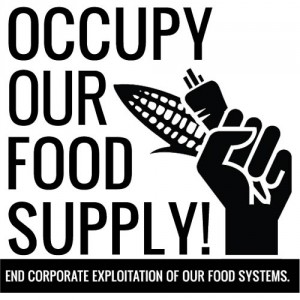By ran.org (Rainforest Action Network)
Organizers call today’s (February 27, 2012) Occupy our Food Supply day of action a resounding success. The day included more than 100 events across the globe, united an unprecedented alliance of more than 60 Occupy groups and 30 environmental, food and corporate accountability organizations, and featured prominent voices including Indian environmentalist Vandana Shiva, music legend Willie Nelson, actor Woody Harrelson, authors Raj Patel, Anna Lappe, Gary Paul Nabhan, author Michael Ableman and Marion Nestle, among others.
“At this point, we can barely keep up with all the events and blog postings,” said Hillary Lehr, an organizer for Rainforest Action Network, which helped facilitate the day of action. “From mommy bloggers to Occupy groups, we are seeing an enormous spectrum of people respond to Occupy our Food Supply’s call to resist corporate consolidation of our food systems and create socially and environmentally just local solutions. Plain and simple, it is clear that getting big food giants like Cargill and Monsanto out of our food system is an idea whose time has come.”
[pro_ad_display_adzone id=”110028″]
Across the globe, online and offline, thousands participated in today’s events. Events included a 40 person seed exchange at the New York Stock Exchange hosted by Occupy Wall Street; the building of a community garden in Oakland hosted by Occupy the Food System Oakland; the ‘stickering’ of genetically modified foods at more than 20 Safeway and Whole Foods grocery stores across the country; and more than 100 people in Wayzata, MN convening a Cargill call-in day to CEO Greg Page and an ‘evict Monsanto’ protest is planned for Feb 29th at the Monsanto offices in Lockhart, TX.
“Every stage of the food system involves some sort of destructive or exploitive practice, and we really need to change that,” said Alec Higgins with Occupy Wall Street Food Justice, which organized the seed exchange at the New York Stock Exchange today. “Food is at the core of OWS values. We are coming together around this one thing that is so essential to our well being. It’s what we eat.”
Occupy our Food Supply also had an online face with a blogger and social media day of action, asking influential bloggers, social media users and blog sites to write on the corporate control of food. More than 75 blogs covered the day, from the prominent Huffington Post to the niche CivilEats and Curvy,Foody,Hungry. On twitter, the event reported two to three posts per minute using the #F27 hasthtag.
Never have so few corporations been responsible for more of our food chain. Of the 40,000 food items in a typical US grocery store, more than half are now brought to us by just 10 corporations. Today, three companies process more than 70 percent of all U.S. beef, Tyson, Cargill and JBS. More than ninety percent of soybean seeds and 80 percent of corn seeds used in the United States are sold by just one company: Monsanto. Four companies are responsible for up to 90 percent of the global trade in grain. And one in four food dollars is spent at Walmart.
The overwhelming support for Occupy our Food Supply underscores the unity between farmers, parents, health care professionals, human rights activists, food justice advocates and food lovers around the world who are increasingly viewing their concerns as different manifestations of the same underlying problem: a food system structured for short term profit instead of the long term health of people and the planet.
See the full list of supporting organizations and events at occupyourfoodsupply.org
Quotes from Occupy our Food Supply Supporters
Vandana Shiva, Indian physicist and internationally renowned activist: “Our food system has been hijacked by corporate giants from the Seed to the table. Seeds controlled by Monsanto, agribusiness trade controlled by Cargill, processing controlled by Pepsi and Philip Morris, retail controlled by Walmart – is a recipe for Food Dictatorship. We must Occupy the Food system to create Food Democracy.”
Willie Nelson, Founder and President of Farm Aid: “Nothing is more important than the food we eat and the family farmers who grow it. Corporate control of our food system has led to the loss of millions of family farmers, destruction of our soil, pollution of our water and health epidemics of obesity and diabetes. We simply cannot afford it. Our food system belongs in the hands of many family farmers, not under the control of a handful of corporations.”
Raj Patel, activist, academic and author of The Value of Nothing: “It’s hard for us to imagine life without food corporations because they’ve made our world theirs. Although we think food companies make food for us, in almost every way that matters, we – and our planet – are being transformed to suit food companies. From their marketing to children and exploitation of workers to environmental destruction in search of profit, the food industry represents one of the most profound threats to sustainability we face today.”
Marion Nestle, professor and author of What to Eat and Food Politics: How the Food Industry Influences Nutrition and Health: “While the food industry digs in to fight public health regulations, the food movement will continue to attract support from those willing to promote a healthier and more sustainable food system. Watch for more young people going into farming and more farmers’ markets, farm-to-school programs, school meal initiatives, and grassroots community efforts to implement food programs and legislate local reforms. There is plenty of hope for the future in local efforts to improve school meals, reduce childhood obesity, and make healthier food more available and affordable for all.”
Rukaiya Rofiq, Director of the human rights organization Yayasan SETARA Jambi in Indonesia: “It is encouraging to see Americans connecting the dots between the food choices they make at a grocery store and the serious impacts those choices have here in Southeast Asia. When an additive like palm oil is used to make cheap crackers and cookies it gives companies a green light to expand palm plantations at all costs which is why we see community member homes bulldozed when they fight expansion, Indigenous land rights ignored, and natural rainforests completely decimated. Invisible companies like Cargill, who are profiting off the backs of Indonesians, must be held accountable in the countries they call home.”
Michael Ableman, farmer and founder of the Center for Urban Agriculture in Goleta, California: “We are focusing on what we are for, as much as what we are against. We are re-occupying our soils with life and fertility and our communities with good food. We are working to rebuild the real economy, one based on soil and seeds and sunlight and individuals and communities growing together.”
Rainforest Action Network runs hard-hitting campaigns to break North America’s fossil fuels addiction, protect endangered forests and Indigenous rights, and stop destructive investments around the world through education, grassroots organizing, and non-violent direct action. For more information, please visit: www.ran.org
[adrotate group=”14″]
[pro_ad_display_adzone id=”110027″]







